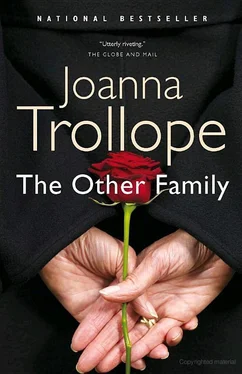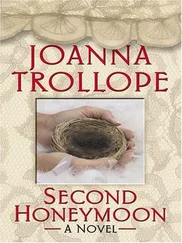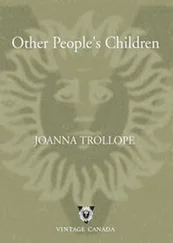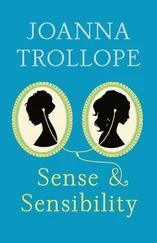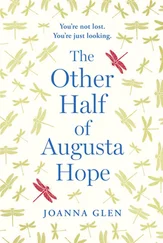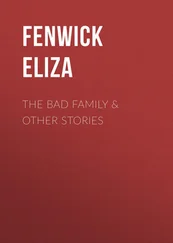Joanna Trollope - The Other Family
Здесь есть возможность читать онлайн «Joanna Trollope - The Other Family» весь текст электронной книги совершенно бесплатно (целиком полную версию без сокращений). В некоторых случаях можно слушать аудио, скачать через торрент в формате fb2 и присутствует краткое содержание. Жанр: Старинная литература, на английском языке. Описание произведения, (предисловие) а так же отзывы посетителей доступны на портале библиотеки ЛибКат.
- Название:The Other Family
- Автор:
- Жанр:
- Год:неизвестен
- ISBN:нет данных
- Рейтинг книги:5 / 5. Голосов: 1
-
Избранное:Добавить в избранное
- Отзывы:
-
Ваша оценка:
- 100
- 1
- 2
- 3
- 4
- 5
The Other Family: краткое содержание, описание и аннотация
Предлагаем к чтению аннотацию, описание, краткое содержание или предисловие (зависит от того, что написал сам автор книги «The Other Family»). Если вы не нашли необходимую информацию о книге — напишите в комментариях, мы постараемся отыскать её.
The Other Family — читать онлайн бесплатно полную книгу (весь текст) целиком
Ниже представлен текст книги, разбитый по страницам. Система сохранения места последней прочитанной страницы, позволяет с удобством читать онлайн бесплатно книгу «The Other Family», без необходимости каждый раз заново искать на чём Вы остановились. Поставьте закладку, и сможете в любой момент перейти на страницу, на которой закончили чтение.
Интервал:
Закладка:
Richie had been the one who was good at comfort, at subduing resistant adolescent limbs and frames into affectionate acquiescence.
‘Sorry,’ Chrissie said into Amy’s hair.
Amy sighed.
‘What for?’ she said. ‘You didn’t kil him. He just died.’
For being here, Chrissie wanted to say, for being here when he isn’t.
‘We just have to do it,’ she said instead, ‘hour by hour. We just have to get through.’
Amy shifted, half pul ing away.
‘I know.’
Chrissie looked at the Nurofen.
‘Want something to relax you? Help you sleep?’
Amy grimaced. She shook her head.
Chrissie said, ‘What are the others doing?’
‘Dil y’s got her door shut. Tam’s talking to Robbie.’
‘ Still ?’
‘Stil ,’ Amy said. She looked round the bedroom. Her glance plainly hurried over the slippers, the far pil ows. ‘I don’t know what to do.’
‘Nor me,’ Chrissie said.
Amy began to cry again. Chrissie tightened the arm round her shoulders, and pressed Amy’s head against her.
‘I know, baby—’
‘I can’t stand it—’
‘Do you,’ Chrissie said, ‘want to sleep with me?’
Amy stopped crying. She looked at the extra pil ows. She shook her head, sniffing.
‘Couldn’t. Sorry.’
‘Don’t have to be sorry. Just a suggestion. We’l none of us sleep, wherever we are.’
‘When I wake up next,’ Amy said, ‘there’l be a second before I remember. Won’t there?’
Chrissie nodded. Amy disengaged herself and trailed towards the door. In the doorway she paused and took the red clip out of her hair and snapped it once or twice.
‘At least,’ she said, not turning, not looking at her mother, ‘at least we’ve got his name stil . At least we’re al stil Rossiters.’ She gave a huge shuddering sigh. ‘I’m going to play my flute.’
‘Yes,’ Chrissie said. ‘Yes. You do that.’
Amy flicked a glance at her mother.
‘Dad liked my flute,’ she said.
Then she went slowly away down the landing, shuffling in her little slippers, and Chrissie heard her starting tiredly on the stairs that led to the second-floor conversion that she and Richie had decided on and designed so that Dil y and Amy could have bedrooms of their own.
She did sleep. She had thought she neither could nor should, but she fel into a heavy, brief slumber and woke two hours later in order to fal instead into a pit of grief so deep that there seemed neither point nor possibility of climbing out of it. She had no idea how long she wrestled down there, but at some moment she exchanged her embrace of the Dalmatian hot-water bottle for one of Richie’s pil ows, scented with the stuff he used on the grey streaks in his hair, and found herself crushing it, and groaning, and being suddenly and simultaneously aware that there were lines of incipient daylight above the curtain tracks, and that a bird or two was tuning up in the plane tree outside the window. She rol ed over and turned on the light. It was six-thirteen. She was six hours and thirteen minutes, only, into the first day of this chapter of life which she had always dreaded and, consequently, had never permitted herself to picture.
‘I’l be a hopeless widow,’ she used to say to Richie, and, if he was paying attention, he’d say back, ‘Wel , I’m not giving you the chance to find out,’ and then he’d sing her something, a line or two of some Tony Bennett or Jack Jones bal ad, and deflect the moment. He’d always done that, defuse by singing. Once she thought it was wonderful. Recently, however, in the last year or two, she thought he found it easier to sing than to engage. Oh God, if only! If only he had engaged! If only he’d done even that!
She drew her left hand out from under the duvet, and looked at it. It was a wel -kept, pretty hand, as befitted a wel -kept, pretty woman. It bore a narrow white-gold plain band and a half-hoop of diamonds. The plain band was not new, in fact it was quite worn, having been on Chrissie’s finger since shortly after Tamsin’s birth. She remembered the occasion exactly, since she had bought it herself, in order to wear it in hospital, and put it on her own finger. The diamonds, however, were new. They were quite big, bigger than they possibly might have been had they been dug out of the faraway depths of South Africa. Instead, they had been made, ingeniously, in a smal factory near Antwerp, by a process which simulated what nature might have managed over mil ennia, but in only three weeks. They were, Chrissie told Richie, known as industrial diamonds. He had looked at her hand, and then his attention went back to his piano and he played a few bars of Gershwin, and then he said, ‘You wear them, sweetheart. If they make you happy.’
She said, ‘You know what would make me happy.’
Richie went on playing.
She said, ‘I have to be Mrs Rossiter, for the girls. I have to be Mrs Rossiter at school. I have to wear a wedding ring and be Mrs Rossiter.’
‘OK,’ Richie said softly. He began on some mounting chords. ‘Course you do.’
‘Richie—’
‘Wear the diamonds,’ Richie said. ‘Wear them. Let me pay for them.’
But she hadn’t. She told herself that it was principle, that a woman of independent mind could buy her own manifestations of the outward respectability required at the school gates, even in liberal-minded North London. For a week or two, she registered the glances cast at her sizeable diamonds – and the conclusions visibly drawn in consequence – with satisfaction and even tiny flashes of triumph. When Tamsin, who missed no detail of anyone’s appearance, said, ‘Oh my God, Mum, did Dad give you those?’ she had managed a smal , self-conscious smile that could easily have passed for coquettish self-satisfaction. But then heart quietly overcame head with its usual stealthy persistence, and the independence and the triumph faded before the miserable and energetic longing for her status as Mrs Rossiter to be a reality rather than a fantasy adorned with meaningless – and engineered – symbols.
It wasn’t real y just status either. She was Richie’s manager, after al , the control er and keeper of his diary, his finances, his pragmatical y necessary wel -being. She had plenty of status, in the eyes of Richie’s profession, as Christine Kelsey, the woman – girl, back then – who had persuaded Richie Rossiter that a bigger, younger audience awaited him outside the Northern circuit where he had thus far spent al his performing life. Richie only answered the telephone for pleasure and left al administration, and certainly anything technological, to her. No, it wasn’t real y status, it real y wasn’t.
It was instead that hoary old, urgent old, irreplaceable old need for commitment. In twenty-three years together, Chrissie could not shift Richie one mil imetre towards divorcing his wife, and marrying her. He wasn’t Catholic, he wasn’t in touch with his wife, he wasn’t even much in touch with his son by that marriage. He was living in London, in apparent contentment, with a woman he had elected to leave his wife for, and the three daughters he had had by her and with whom he was plainly besotted, but he would make no move of any kind to transfer his legal position as head of his first family to head of his second.
For years, he said he would think about it, that he came from a place and a background where traditional codes of conduct were as fundamental to a person as their heartbeat, and therefore it would take him time. And Chrissie at first understood that and, a little later in this relationship, continued at least to try and understand it. But his efforts – such as they had ever real y been – dwindled to invisibility over time, corresponding inevitably with a rise in Chrissie’s anxiety and insistence. The more she asked – in a voice whose rigorously modulated control spoke volumes –
Читать дальшеИнтервал:
Закладка:
Похожие книги на «The Other Family»
Представляем Вашему вниманию похожие книги на «The Other Family» списком для выбора. Мы отобрали схожую по названию и смыслу литературу в надежде предоставить читателям больше вариантов отыскать новые, интересные, ещё непрочитанные произведения.
Обсуждение, отзывы о книге «The Other Family» и просто собственные мнения читателей. Оставьте ваши комментарии, напишите, что Вы думаете о произведении, его смысле или главных героях. Укажите что конкретно понравилось, а что нет, и почему Вы так считаете.
